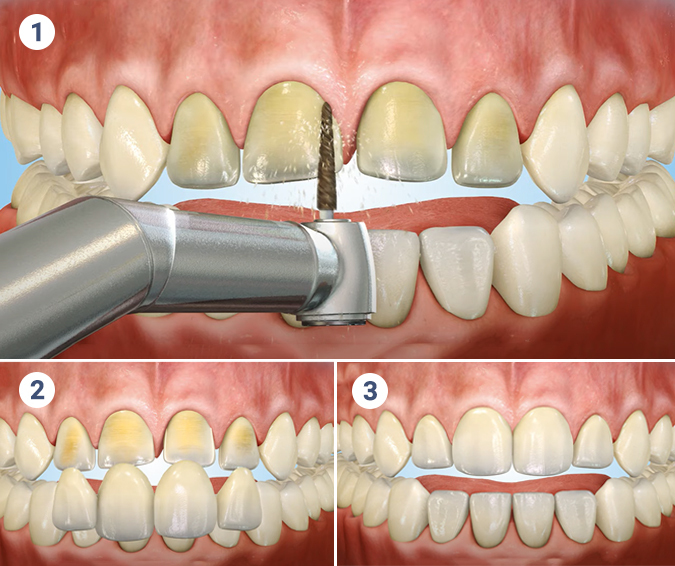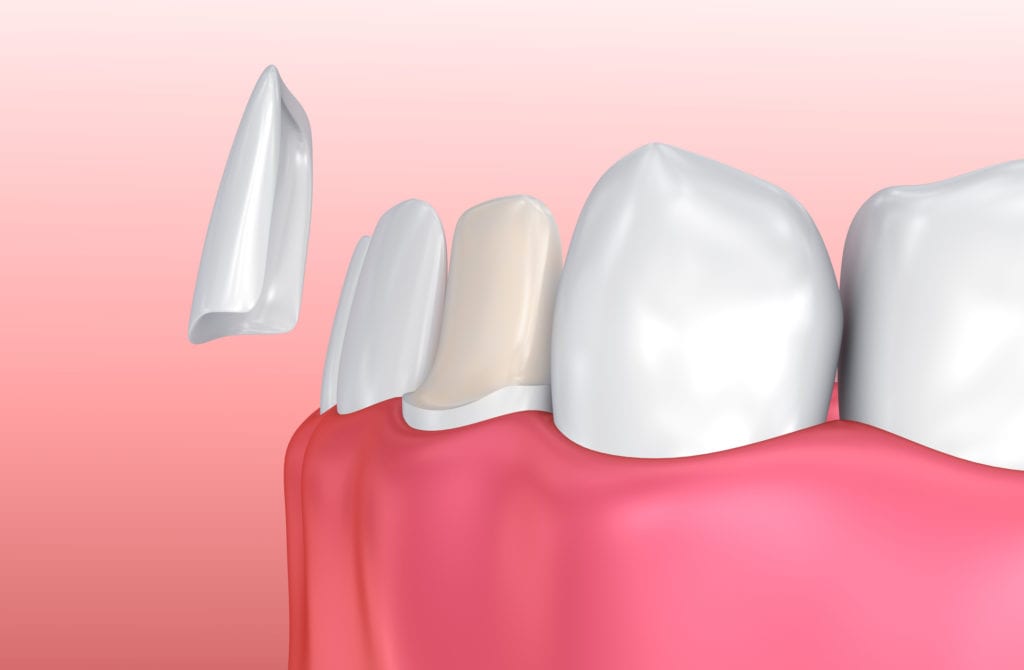The Full Overview of Veneers: Kinds, Makes use of, and Their Effect on Your Smile
Veneers act as a prominent option for individuals seeking to boost their oral looks. These custom-crafted coverings can efficiently mask blemishes such as staining and voids. With two main types offered, porcelain and composite resin, each offers distinct advantages and limitations. The effect of veneers extends beyond simple appearance, affecting self-esteem and social interactions. Recognizing their types and advantages is vital. What might this indicate for one's overall lifestyle?
Understanding Veneers: What They Are and Just how They Function
Veneers are slim shells, generally made from porcelain or composite resin, that are custom-crafted to fit over the front surface area of teeth. They serve both useful and aesthetic functions, giving a solution for different dental imperfections such as discoloration, voids, and minor misalignments. By adhering to the tooth enamel, veneers produce an all-natural look while enhancing the form and shade of the teeth.
The procedure typically includes a preliminary examination, where a dentist analyzes the client's needs and discusses desired end results - Porcelain Veneers Dentist. Following this, a marginal quantity of enamel might be removed to suit the veneer. Impressions of the teeth are then taken to guarantee a precise fit. When made, the veneers are adhered safely to the teeth making use of an unique oral adhesive. This treatment not just enhances the smile's look yet additionally assists secure the underlying teeth from additional damages, making veneers a preferred option for many seeking a smile remodeling
Sorts of Veneers: Porcelain vs. Composite Resin
The difference in between porcelain and composite material veneers hinges on their material make-up and attributes. Each type provides varying levels of durability, price, and long life, influencing patients' choices based upon their individual needs. Recognizing these differences is crucial for making a notified choice pertaining to oral improvements.
Material Distinctions Clarified
While both porcelain and composite material veneers offer the very same cosmetic purpose, they vary substantially in product properties, toughness, and aesthetic end results. Porcelain veneers are crafted from a ceramic material that simulates the natural translucence of teeth, providing a natural appearance. Their smooth surface area is resistant to discoloration, making them an attractive choice for those seeking a long-lasting visual. On the other hand, composite material veneers are made from a tooth-colored plastic material, supplying versatility and ease of application. Nevertheless, they might not attain the same level of brightness or clarity as porcelain. Additionally, composite veneers can be more conveniently shaped and repaired, making them a much more adaptable option in particular dental situations. Each type provides distinct advantages tailored to individual choices.
Long life and Durability
Longevity and longevity are considerable factors when comparing porcelain and composite material veneers. Porcelain veneers are known for their stamina, typically lasting 10 to 15 years with appropriate treatment. Their durability against tarnishing and breaking makes them a popular selection for individuals looking for long-term outcomes. On the other hand, composite material veneers normally have a much shorter lifespan, averaging 5 to 7 years. While they can be fixed a lot more easily if harmed, they are extra at risk to wear and discoloration with time. The option in between these materials typically depends on the individual's way of living, visual objectives, and upkeep preferences. Ultimately, understanding the differences in longevity and resilience can guide people in choosing the veneer type that finest matches their demands.
Price Comparison Insights
Price is a crucial factor to consider when picking in between porcelain and composite material veneers. Porcelain veneers normally range from $800 to $2,500 per tooth, showing their durability, visual charm, and resistance to staining. These veneers require a more extensive treatment and specialized laboratory job, adding to their greater price. In contrast, composite material veneers are normally much more budget-friendly, setting you back between $250 and $1,500 per tooth. They can be used in a single visit, which lowers labor costs. Composite veneers may require a lot more constant replacements, potentially increasing lasting expenses. Eventually, the choice between porcelain and composite material veneers depends on specific budget plans and wanted outcomes, balancing first expenses against durability and aesthetic outcomes.
The Advantages of Deciding On Veneers for Your Smile
Selecting veneers offers considerable benefits for those looking for an enhanced smile. Their improved visual allure can transform the appearance of teeth, while their stain-resistant buildings guarantee an enduring brightness - Porcelain Veneers Dentist. This combination makes veneers a preferred alternative for individuals looking to accomplish a flawless smile
Improved Visual Appeal
When individuals seek to boost their smiles, veneers often become a favored solution as a result of their transformative visual benefits. These slim shells, usually made of porcelain or composite material, can successfully conceal imperfections such as chips, voids, and imbalance. By imitating the all-natural look of teeth, veneers offer a smooth, radiant smile. Their customizable nature permits for a tailored technique, enabling people to select tones and shapes that ideal fit their face functions. Additionally, veneers can create a consistent appearance, boosting general face balance. This aesthetic improvement not only boosts confidence but can additionally positively affect individual relationships and social interactions, making veneers a preferred choice for those looking to attain a brighter, much more eye-catching smile.
Stain Resistance Perks
Veneers not just enhance visual charm yet also use significant discolor resistance, making them an eye-catching option for individuals worried about maintaining a bright smile. Made up of sturdy materials such as porcelain or composite resin, veneers are less permeable than all-natural teeth, which assists protect against the absorption of stains from typical wrongdoers like coffee, tea, and merlot. This integral stain resistance enables people to appreciate their favorite beverages without stressing about staining. What Are Veneers. Furthermore, the smooth surface of veneers makes them much easier to tidy, more improving their longevity and keeping their pristine appearance. Because of this, veneers give a sensible solution for those looking for both appeal and functionality in their dental care
The Process of Getting Veneers: What to Expect

Although the process of getting veneers may seem intimidating, recognizing the actions entailed can alleviate issues. An examination with a dental expert is required to determine if veneers are the appropriate service for the individual's oral issues. Throughout this consultation, the dentist will certainly review wanted end results and take perceptions of the teeth.
Next, a 2nd visit is arranged for tooth prep work, where a percentage of enamel is usually eliminated to accommodate the veneers. Short-lived veneers might be put while the custom ones are crafted in an oral lab, which normally takes a couple of weeks.
As soon as ready, the dental practitioner will position the veneers, ensuring correct fit and shade before bonding them to the teeth making web use of a special adhesive. After final changes, the dental expert will give assistance on treatment. Understanding these steps can assist patients really feel much more comfy and notified throughout the veneer process.
Upkeep and Take Care Of Your Veneers
Preserving veneers calls for constant treatment to guarantee their durability and look. Proper oral hygiene is necessary; brushing twice daily with a non-abrasive toothpaste and flossing regularly help stop plaque build-up around the veneers. Additionally, regular dental exams are crucial for checking the condition of the veneers and attending to any type of potential problems at an early stage.
Individuals need to prevent tough foods and excessive force when biting to avoid damages. It's likewise suggested to limit consumption of staining compounds, such as coffee, tea, and red wine, as these can impact the veneers' color gradually.

Changing Your Smile: Real-Life Impact of Veneers
A glowing smile can considerably enhance one's self-confidence and overall look. For lots of people, veneers act as a transformative option, properly dealing with numerous dental problems such as staining, gaps, and misalignment. These slim coverings, personalized to fit over the front of the teeth, can produce a harmonious and aesthetically pleasing smile.
Real-life instances highlight the profound impact veneers can have. Individuals often report a prompt increase in self-confidence and social communications following their treatment. The newfound confidence can bring about even more chances in professional and personal life, as people feel even more likely to involve and share themselves.
Additionally, the emotional advantages extend beyond simple look; numerous experience improved psychological health as they embrace their smiles. Subsequently, veneers not only enhance the original source physical characteristics however additionally contribute substantially to general high quality of life, highlighting their worth in aesthetic dental care.
Frequently Asked Questions
How Much Time Do Veneers Usually Last Prior To Requiring Replacement?
Veneers usually last in between 10 to 15 years before requiring substitute. Elements such as dental health, oral routines, and the kind of product used can influence their longevity and total longevity. Regular oral exams are a good idea.
Can Veneers Be Removed, and if So, How?
Yes, veneers can be gotten rid of. A dental professional generally uses customized tools to meticulously remove them from the teeth, guaranteeing very little damages to the underlying enamel, typically adhered to by needed modifications or reconstructions for perfect looks.
Are Veneers Suitable for Everybody's Oral Condition?

Will Obtaining Veneers Pain or Require Anesthesia?
Getting veneers normally involves minimal pain, and many people obtain neighborhood anesthetic to ensure a pain-free experience. Level of sensitivity may happen temporarily later, but the majority of locate the procedure tolerable and are satisfied with the results.
Exactly How Do Veneers Affect Tooth Sensitivity After Placement?
Veneers can briefly enhance tooth sensitivity due to the removal of enamel and the bonding process. Most people experience a reduction in sensitivity in time as the teeth get used to the brand-new veneers.
Veneers are slim coverings, commonly made from porcelain or composite resin, that are custom-crafted to fit over the front surface of teeth. Porcelain veneers are crafted from a ceramic product that simulates the all-natural translucence of teeth, offering a natural look. Porcelain veneers normally range from $800 to $2,500 per tooth, reflecting their longevity, aesthetic appeal, and resistance to staining. In comparison, composite material veneers are usually much more economical, setting you back in between $250 and $1,500 per tooth. Composed of long lasting materials such as porcelain or composite material, veneers are much less permeable than all-natural teeth, which helps prevent the absorption of stains from common more offenders like coffee, tea, and red wine.